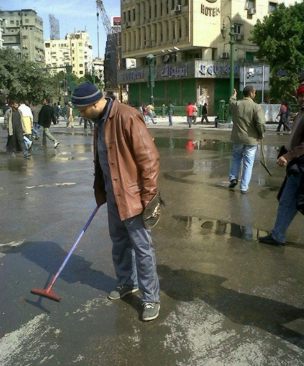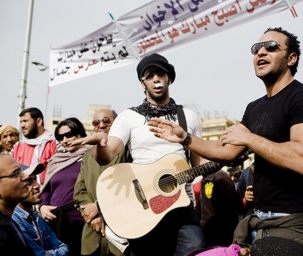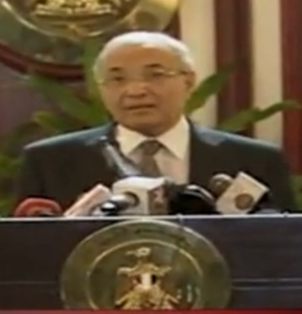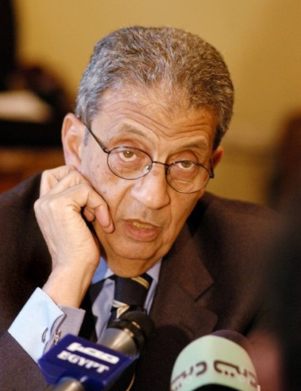|
Egypt Politics Change of momentum in Egypt
The protest camp in central Cairo's Tahrir Square is emptier now than on previous days, as many are going back to work. The army is now trying to ban the next shift of protesters from entering the square while trying to remove some of the barricades set up by protesters around Tahrir.
The question therefore emerges whether the momentum already has been lost for the protesters. "We should have marched [towards the presidential palace] today," protester Mona Seif said from Tahrir Square this night, at 4 AM local time, before going to sleep with the couple of thousands of protesters remaining at the square. In many ways, the Mubarak regime yesterday won an important victory, despite the record number protesting against it. It had managed to intimidate the protesters sufficiently to prevent a march towards the palace. It also experienced that no violence was needed to confront the masses and that the protesters did not pose a real threat. Egyptian Prime Minister Ahmed Shafiq in many ways summed up the situation yesterday, recognising the peaceful and patriotic nature of the protests. He said citizens would of course be free to protest and would not be forcedly removed from Tahrir Square. But the demand that President Mubarak must step down was "unrealistic". There is the stalemate. Protesters say there will be no negotiations and they will not move before Mr Mubarak steps down. The government, having learnt that the protesters no longer pose a great threat, says they can stay on Tahrir - knowing their numbers will become fewer - and is negotia
President Mubarak still has control of the state's repressive apparatus. The police, military police and intelligence service is still very active attacking opposition voices, civil society and the press outside Tahrir Square. Those supporting, reporting about or even organising the protests cannot feel safe in their homes, offices or hotels. Also today, arrests are steadily being reported. Meanwhile, the government is engaging in some negotiations with "opposition parties" that are close to the regime and a so-called "Council of wise men". The little know from these negotiations indicate that the premises laid are that President Mubarak remains in power until the September elections and that the question is how to organise a smooth transition. During the protests, three forces have emerged as spearheads of the Egyptian opposition. Most significantly, this includes Amr Moussa, the very popular Secretary-General of the Arab League and former Foreign Minister (1991-2001) of Egypt. Also Mohammad ElBaradei has gathered increased popular support. The illegal Muslim Brotherhood has taken a more discrete role in the background, but remains a very popular opposition force. These three opposition forces have so far been united, supporting the protesters' demand that President Mubarak m
For the Muslim Brotherhood, there would be much to gain. If let to the negotiation table, the 83-year-old movement finally could get legalised. Several Brotherhood leaders see this as a golden opportunity, holding that it is no longer probable that President Mubarak will be forced to step down. It may be now or never. This morning, the Muslim Brotherhood indicated it would be willing to start negotiating about a democratic transition process. Soon thereafter, however, other Brotherhood leaders strongly rejected this, saying they would stick to the demand of Mr Mubarak's resignation before negotiating. But currently, it seems the Mubarak regime can live with this situation. Indeed, as longer as the stalemate is kept, the protesters and opposition lose their momentum and the regime improves its cards. Another negative effect of the stalemate is the signal sent out to other Arab countries, where protests are in the making. Could the violent Mubarak model work also for other Arab dictators? Currently, there are two models for organising and suppressing protests; Tunisia and Egypt. What will this mean for Morocco, Algeria, Libya, Sudan, Jordan, Syria and Yemen? By Rainer Chr. Hennig © afrol News - Create an e-mail alert for Egypt news - Create an e-mail alert for Politics news
On the Afrol News front page now
|
front page
| news
| countries
| archive
| currencies
| news alerts login
| about afrol News
| contact
| advertise
| español
©
afrol News.
Reproducing or buying afrol News' articles.
You can contact us at mail@afrol.com











